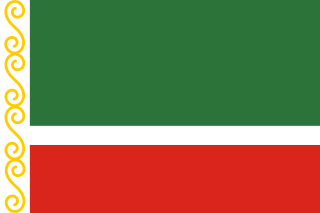
Chechnya, officially the Chechen Republic, is a republic of Russia. It is situated in the North Caucasus of Eastern Europe, between the Caspian Sea and Black Sea. The republic forms a part of the North Caucasian Federal District, and shares land borders with Georgia to its south; with the Russian republics of Dagestan, Ingushetia, and North Ossetia–Alania to its east, north, and west; and with Stavropol Krai to its northwest.

The First Chechen War, also referred to as the First Russo-Chechen War, was a struggle for independence waged by the Chechen Republic of Ichkeria against the Russian Federation from 11 December 1994 to 31 August 1996. This conflict was preceded by the battle of Grozny in November 1994, during which Russia covertly sought to overthrow the new Chechen government. Following the intense Battle of Grozny in 1994–1995, which concluded with a pyrrhic victory for the Russian federal forces, Russia's subsequent efforts to establish control over the remaining lowlands and mountainous regions of Chechnya were met with fierce resistance and frequent surprise raids by Chechen guerrillas. The recapture of Grozny in 1996 played a part in the Khasavyurt Accord (ceasefire), and the signing of the 1997 Russia–Chechnya Peace Treaty.
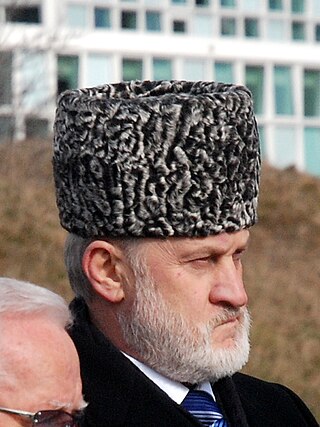
Akhmed Halidovich Zakayev is a Chechen statesman, political and military figure of the unrecognised Chechen Republic of Ichkeria (ChRI). Having previously been a Deputy Prime Minister, he now serves as Prime Minister of the ChRI government-in-exile. He was also the Foreign Minister of the Ichkerian government, appointed by Aslan Maskhadov shortly after his 1997 election, and again in 2006 by Abdul Halim Sadulayev. An active participant in the Russian-Chechen wars, Zakayev took part in the battles for Grozny and the defense of Goyskoye, along with other military operations, as well as in high-level negotiations with the Russian side.
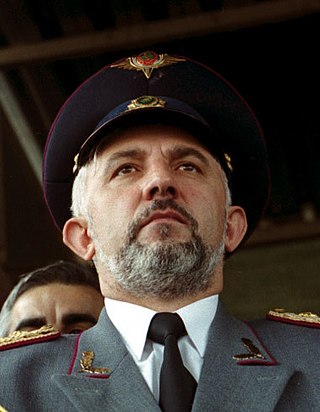
Aslan (Khalid) Aliyevich Maskhadov was a Soviet and Chechen politician and military commander who served as the third president of the unrecognized Chechen Republic of Ichkeria.
The history of Chechnya may refer to the history of the Chechens, of their land Chechnya, or of the land of Ichkeria.

Zelimkhan Abdulmuslimovich Yandarbiyev was a writer and politician from Chechnya, who served as second president of the Chechen Republic of Ichkeria between 1996 and 1997. In 2004, Yandarbiyev was assassinated while he was on mission to recognize Chechnya’s right for independence in Qatar.
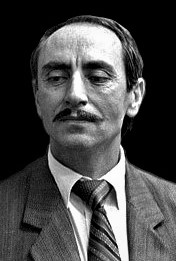
Dzhokhar Musayevich Dudayev was a Chechen politician, statesman and military leader of the 1990s Chechen independence movement from Russia. He served as the first president of the Chechen Republic of Ichkeria from 1991 until his assassination in 1996. Dudayev had previously served as a senior officer in the Soviet Air Forces.
The Caucasian Common Market was a private holding company created to bring prosperity and well-being to the North Caucasus, and in addition, its recognition by the world community as an important subject of international commodity exchange and, consequently, international law.

The All-National Congress of the Chechen People (NCChP) of the Chechen Republic of Ichkeria came to power on 1 November 1991 under president Dzhokhar Dudayev, a former commander of the Soviet air force base in Tartu, Estonia. Since its formation, the organization advocated sovereignty for Chechnya as a separate republic within the Soviet Union. During the period of Soviet breakup, it switched this to explicit support for the separation of "Ichkeria" from Russia.

The Chechen Republic of Ichkeria, known simply as Ichkeria, and also known as Chechnya, was a de facto state that controlled most of the former Checheno-Ingush ASSR from 1991 to 2000 and has been a government-in-exile since.
Movladi Saidarbievich Udugov is the former First Deputy Prime Minister of the Chechen Republic of Ichkeria (ChRI). As a Chechen propaganda chief, he was credited for the Chechens' victory on the information front during the First Chechen War.

The Republic of Chechnya is a constituent republic and federal subject of the Russian Federation. It is located in the Caucasus region in southwest Russia. It is the political successor of the Checheno-Ingush Autonomous Soviet Socialist Republic. From a centralized form of government during the existence of the Soviet Union, the republic's political system went upheavals during the 1990s with the establishment of the Chechen Republic of Ichkeria, leading to the First Chechen War and the Second Chechen War which left the republic in total devastation. In 2000, following Russia's renewed rule, a local, republican form of government was established in the republic under the control of the Russian federal government.
The Russia–Chechnya Peace Treaty of 1997, also known as the Moscow Peace Treaty, was a formal peace treaty "on peace and the principles of Russian–Chechen relations" following the First Chechen War of 1994–1996. It was signed by the president of Russia Boris Yeltsin and the newly elected president of Chechnya Aslan Maskhadov on 12 May 1997, in the Moscow Kremlin.
On March 20, 2010, a Circassian Congress was held in the Georgian capital of Tbilisi, funded in part by the Circassian members of the Western political analysis center, the Jamestown Foundation and the Ilia State University's International School for Caucasus Studies in Georgia.

The Chechen–Russian conflict was the centuries-long ethnic and political conflict, often armed, between the Russian, Soviet and Imperial Russian governments and various Chechen forces. The recent phase of the conflict started after the dissolution of the Soviet Union in 1991 and ended with the oppression of Chechen separatist leaders and crushing of the separatist movement in the republic proper in 2017.
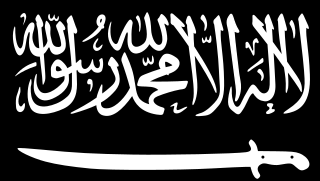
The Province of Nokhchicho was the Chechen-based wing of the Caucasus Emirate organisation. It was created in 2007 as one of the Emirate's six vilayats, replacing the Chechen Republic of Ichkeria.
Isa Akhyadovich Munayev was a Chechen rebel and military commander who fought for the independence of the Chechen Republic of Ichkeria from Russia until he was forced into exile in Europe around 2004. He was killed in action while leading a Chechen volunteer unit on the Ukrainian side during the war in Donbas in 2015.

The resolution on recognition of the state sovereignty of the Chechen Republic of Ichkeria was a bill proposed by Oleksiy Honcharenko and Musa Mahomedov in which the Verkhovna Rada, the Ukrainian parliament, would have voted on the recognition of Chechnya's independence, in response to Russia's recognition of the Luhansk People's Republic and the Donetsk People's Republic.

Chechen volunteers on the side of Ukraine are armed Chechen volunteers and other formations fighting on the side of Ukraine in the Russo-Ukrainian war. These formations have been fighting on the side of Ukraine since the start of the conflict in 2014. The Chechen forces position themselves as the Armed Forces of the Chechen Republic of Ichkeria.
The National Independence Party was a political party in the Chechen Republic of Ichkeria led by human rights activist and businessman Ruslan Kutayev. Initially opposed to the government of Dzhokhar Dudayev, the party later shifted in support of him following the beginning of the First Chechen War, and later achieved landslide victories during the 1997 Chechen presidential election.














